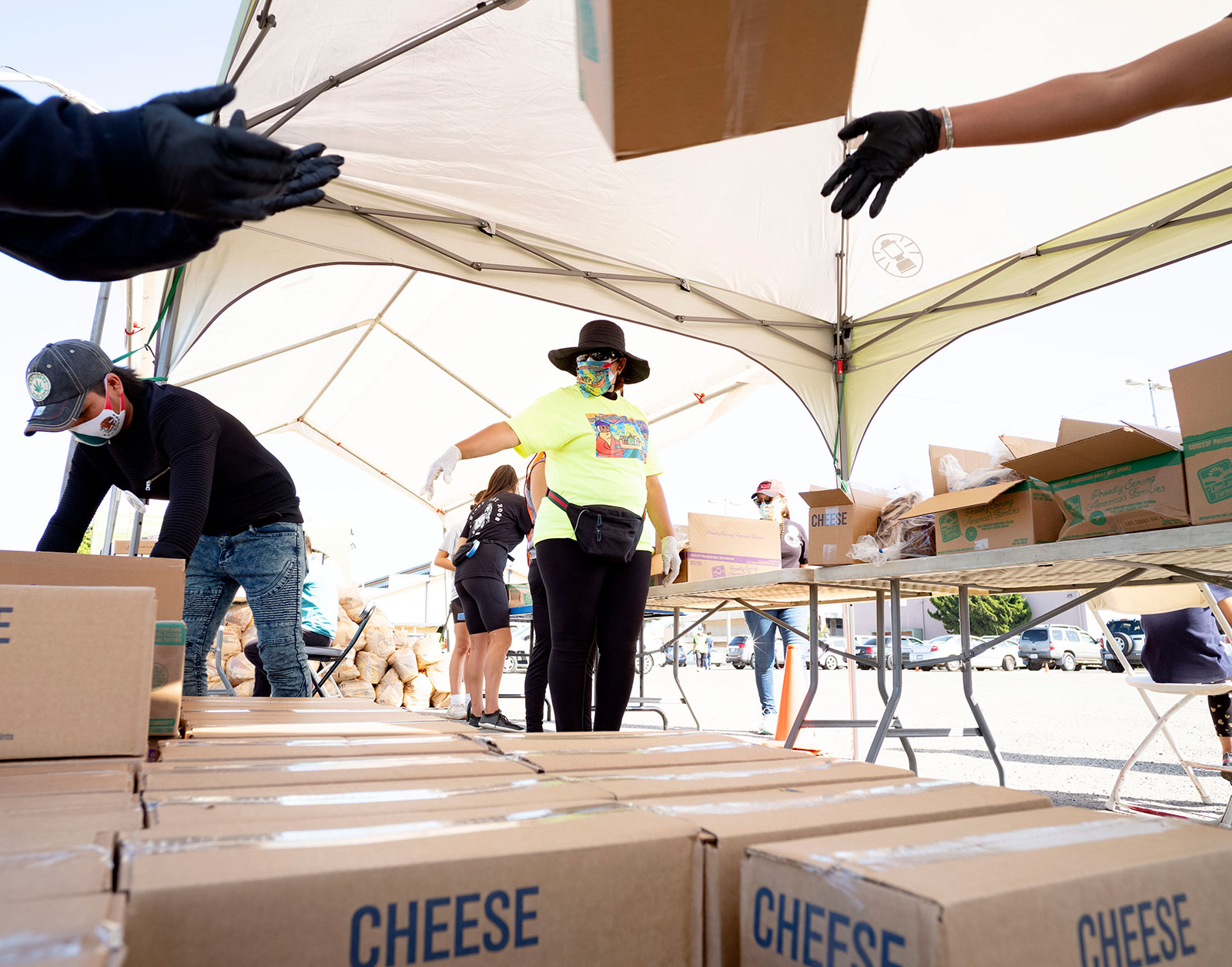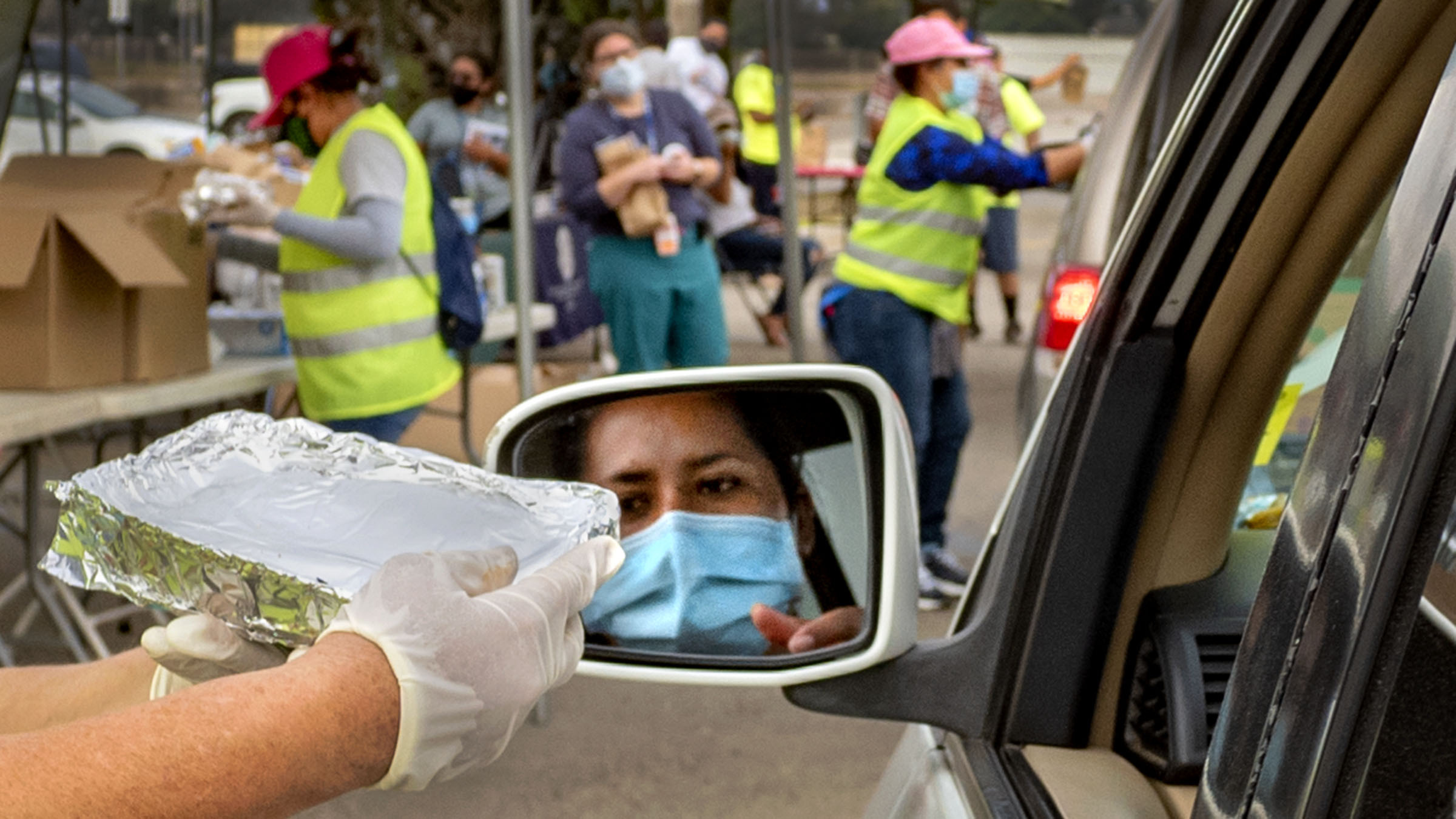A COVID-19 relief package for California’s farmworkers landed on Governor Gavin Newsom’s desk last week. Legislators describe the bill as the first of its kind, and it addresses a wide array of issues, from workplace enforcement of COVID-19 guidance to the expansion of rural telehealth services across the state. But, as the novel coronavirus continues to tear through farmworker communities, such measures may not be enough.
Interviews with farmworkers throughout the state reveal a safety net stretched to the limit: Desperate parents are calling relief and advocacy groups for basic needs like diapers for their babies, quarantined farmworkers sick with COVID-19 are relying on colleagues for deliveries of food and other supplies, and some workers have lost their jobs after calling for better safety measures in the fields and packing plants where they work.
Nowhere is the crisis more palpable than in Monterey County, where agriculture is a leading industry. State Assembly Member Robert Rivas, a primary author of the relief package, pointed out that Latinos represent a “staggering” 93 percent of confirmed COVID-19 cases in the county, though they comprise just 61 percent of the county’s population. A study from the California Institute for Rural Studies found that Monterey County farmworkers are three times more likely to contract COVID-19 than those working in non-agricultural industries.
“These regions in our state — of agricultural workers, of their families — have experienced the worst of the COVID-19 crisis,” Rivas said at a recent press conference. “Many of our agricultural regions here in California have seen disproportionately high rates of COVID-19 cases, and clearly this has threatened California’s most vulnerable workers. It has threatened their families, in an industry that is vital to our food security — not only in California and in the United States, but globally.”
Despite the outsized risks, farmworkers by and large are carrying on with their work whenever possible. One Monterey County farmworker has continued to work through the recent wildfires, despite battling cancer and losing her job four times previously during the pandemic, according to Irene de Barraicua, a spokesperson for Lideres Campesinas, an Oxnard-based network of women farmworker leaders that is calling on Newsom to sign the relief package into law.
“A lot of change has been made,” she said. “Unfortunately, we find that with the crisis it simply just hasn’t been enough.”
The relief package includes three bills. AB 2043 is meant to ensure the enforcement of workplace COVID-19 guidance, and it funds a bilingual outreach campaign to educate agricultural workers about that guidance. It also provides coronavirus-related paid sick leave and workers compensation benefits. AB 2164 aims to improve access to medical care for farmworkers and other marginalized groups by expanding telehealth services for rural and community health centers. AB 2165 will help rural residents who face obstacles filing court documents in person by expanding their ability to electronically file documents in all state trial courts.
Despite being classified as essential workers, farmworkers have found themselves battling COVID-19, wildfire smoke, and a public health system that’s struggled to keep up with the challenges workers face in the fields. Farmworker advocates say that, despite the guidance that’s been issued by public health officials about proper social distancing and the use of personal protective equipment, a lack of enforcement has put the health of farmworkers at risk on the job. Some agricultural workers who have spoken up about the lack of protections have lost their jobs or faced other forms of apparent retaliation.
Irma Escobedo, a pistachio sorter in Kern County, is one of those workers. For nearly two years, Escobedo worked at Primex Farms LLC, a pistachio- and almond-processing facility in Wasco, a city in California’s San Joaquin Valley. Escobedo, a 55-year-old divorced mother of four, worked in a packinghouse room with nearly 20 other people, hand sorting and inspecting pistachios that moved along conveyor belts.
When COVID-19 cases began accelerating in March, Escobedo told Grist that she and her co-workers knew very little about the virus. But, when Escobedo started wearing a mask due to her own concerns, she was initially told she couldn’t enter the facility with her mask unless a doctor had prescribed its use. Later that spring, her coworkers began to disappear from their assigned spots along the conveyor belt. When Escobedo and her fellow sorters began asking why, she says their supervisors kept them in the dark as to why other workers weren’t showing up, citing medical confidentiality.
Escobedo’s fears that the coronavirus had spread to her workplace seemed to be confirmed when her friend Maria Hortencia Lopez, 57, died in July after exhibiting COVID-19 symptoms. (Primex told Cal Matters that Lopez, who was technically a third-party contractor, died from pneumonia and never tested positive for COVID-19, though union officials disputed this.) At least six other women who worked in that same sorting room also got sick, said Escobedo, who was herself hospitalized for COVID-19 and pneumonia in June.
“This is something that could have all been avoided… had they informed us of what was happening, and if they had taken action immediately and prevented the cases from spreading,” Escobedo told Grist in Spanish. “We went to work not knowing that our workplace was contaminated.”
In a written response to Grist, Primex said that the company has worked hard to protect and support its employees through the crisis. To try to prevent the coronavirus from spreading at its Wasco plant, the company said that it has instituted temperature-monitoring of employees before shifts, sanitizing and sterilizing of high-touch surfaces, employee hand sanitizing at time-clock check-ins, and physical distancing of six feet between employees. It also said that employees over the age of 65 can self-quarantine without financial consequences. Primex also stated that the company asked its employees to wear masks in early April before making the practice mandatory on June 15. In addition, Primex said that it closed its plant in late June to conduct a “rigorous” testing program and a deep cleaning of the plant.
Nevertheless, by early July, 91 Primex workers in Wasco were infected with COVID-19, along with 23 of their children and 36 relatives for a total of about 150 people, according to Armando Elenes, Secretary Treasurer for the Delano-based United Farm Workers of America (UFW) union. Some of the workers asked for time off to quarantine because they didn’t want to take the risk, but they were forced to resign because the company wouldn’t make exceptions to its standard procedures, Elenes said.
“We’d like for them to treat us like we matter, as people — not treat us like we’re just a number,” said Escobedo, whose 19-year-old daughter also came down with COVID-19 while working at Primex. “We’d like for them to treat us as human beings.”
Escobedo, who is a member of the UFW, recovered from COVID-19 at home while continuing to advocate for her coworkers, sharing information with colleagues, and speaking out in the media to raise awareness about working conditions faced by farmworkers. Ultimately, while still recovering she learned she had lost her contract job in late June, along with other coworkers who have been active in the campaign to raise awareness about Primex’s response to the pandemic. She has yet to find a new job.
That same month, the UFW filed an unfair labor practice complaint with the National Labor Relations Board, alleging the company illegally retaliated against the workers who spoke up. Primex told the workers the company was cutting staff because of a lack of work, according to the UFW. (In an interview with Cal Matters, Primex’s chief operating officer denied that the company engaged in retaliation.)
“I brought my daughter to work thinking it was a safe place for her to work with me, and she got sick, too. It’s just not right that [Primex] didn’t take action, that they didn’t inform us what was happening, that they didn’t share any information,” said Escobedo. “They didn’t do what I believe every company should do, which is look out for their workers.”

Carmen “Carmelita” Obeso (center) directs volunteers as they prepare food boxes to donate to fellow farmworkers in Oxnard, California, on September 20, 2020. Daniel A. Anderson for Grist
Earlier this year, Grist featured Carmen “Carmelita” Obeso, an Oxnard strawberry picker, in a story highlighting the risks that farmworkers faced due to a lack of worker safety protections, limited access to health care, and crowded living conditions across the state. Many advocates feared that these conditions could lead to a major COVID-19 outbreak, and those concerns were validated this summer, as farmworker communities across the state were hit hard by the pandemic. As the country navigated the perils and unknowns of the novel coronavirus, California designated farmworkers “essential.” Obeso feared that the pandemic would not only put agricultural workers’ health at risk, but also their already-fragile financial standing as well.
A study examining conditions among California’s farmworkers during the pandemic, which was released by the California Institute for Rural Studies in July, found that these workers have lost work and wages during the pandemic and yet continue to lack access to health care and public assistance programs. In some cases, farmworkers experienced a drop of nearly 40 percent in work from April to June, that study found. Another study from the University of California, Los Angeles, shows that deaths among working Latinos have quintupled since May, in large part because Latinos comprise a large portion of the state’s essential workers, from farmworkers to truck drivers to meat and vegetable packers.
“COVID-19‒associated deaths are burning their way through the entire Latino working-age population,” the study concluded.
Given the frayed social safety net, food insecurity among these essential workers is a particularly acute issue —and farmworkers have turned to each other for help. A coalition of Oxnard farmworkers, including Obeso, recently launched a community project called “De Campesinxs a Campesinxs (From Farmworkers to Farmworkers): Feeding those who feed us.” Since April, the coalition has provided a monthly distribution of food, clothing, and other items like school supplies to hundreds of farmworkers and their families. The volunteers also coordinate food deliveries for families that are quarantined in their homes, as well as workers quarantined in motels. They help farmworkers navigate and apply for relief programs. The project is spearheaded by farmworkers from Lideres Campesinas and Alianza Nacional de Campesinas, a national alliance of farmworker women that works to create healthier workplaces, homes, and communities for its members by addressing social, environmental, and economic justice issues.
“There’s no end to this work,” said Obeso, who oversees the food drives as a member of Lideres Campesinas. “Everyone is at risk, and we continue to live in fear, but we have to learn how to survive this.”
Hundreds of cars lined up in the parking lot of a Masonic temple in Oxnard on Sunday, winding their way down the street. Some families waited for four hours in advance of the coalition’s monthly donation giveaway, which included staples such as rice, sugar, spices, as well bags of snacks and Gerber baby cereal. As farmworker volunteers flipped quesadillas on a griddle and prepped hot dogs to give away as hot meals, another team sorted and prepared boxes of frozen pork and chicken, as well as bags of cheese.
Nearby, UFW volunteers filled pouches with markers, crayons, pens, and other school supplies, while Lideres Campesinas volunteers prepared paper sacks filled with masks and information on COVID-19 and the U.S. Census. What began as 50 food donation giveaways in April quickly expanded as more organizations stepped up to help. Today, 24 organizations and two Southern California universities are involved. The coalition gives away between 750 and 1,000 food donations each month because the need among farmworkers in particular is so high, according to Elizabeth Cordero, co-founder and board president of the Alianza Nacional de Campesinas and Mily Treviño-Sauceda, one of the founders of Lideres Campesinas.
“Farmworkers are working and picking fruits and vegetables, but they can’t even eat what they harvest,” Treviño-Sauceda told Grist on Sunday, as she helped distribute food.
The coalition offers help to anyone who shows up at the monthly distribution, including the homeless or those who have been displaced by wildfires. As cars filled with families inched forward on Sunday to collect their food, Obeso went from window to window chatting with the farmworkers, asking how their families were surviving. One strawberry picker, a mother of five children, said that sometimes her food doesn’t last long enough to feed her children — and that one of the toughest parts of the pandemic has been finding babysitters to care for her children, who are now distance-learning at home. It’s their stories that keep Obeso going, despite the workload.
“These past few days have been intense, because we’ve been working nonstop since Wednesday to prepare for this distribution. It’s a lot of work, but we’ll be here until the end,” Obeso said, standing between rows of idling cars. “As long as we have the support to continue this work, we’ll give it our all.”




